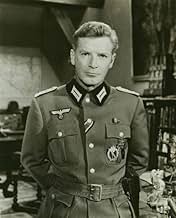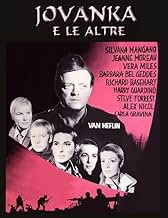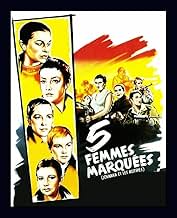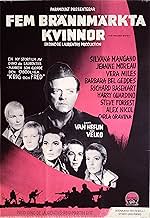Five Yugoslav women who consorted with the German occupiers are publicly humiliated and banished by the Yugoslav partisans but they take up arms to fend for themselves.Five Yugoslav women who consorted with the German occupiers are publicly humiliated and banished by the Yugoslav partisans but they take up arms to fend for themselves.Five Yugoslav women who consorted with the German occupiers are publicly humiliated and banished by the Yugoslav partisans but they take up arms to fend for themselves.
Sidney Clute
- Milan
- (as Sid Clute)
6.6654
1
2
3
4
5
6
7
8
9
10
Featured reviews
No place for love or mercy in wartime
This relatively unknown gathers a very impressive cast of both European and American actors and actresses. Silvia Mangano gives a fine performance as the leader of the titled women. These women are casted away from a little town in Yugoslavia 1943 because they have slept with a Nazi Sargent (except innocent Vera Miles who didn't go beyond kissing but anyway is accused as the others), not before they are humiliated by their own people by cropping their hair.
The girls bound together and they wander around the country until they resolve to join the partisans despite their initial resilience. The women will form relationships with the partisans and a captured German Captain (R. Basehart).
But it's wartime and this is no Hollywood movie: there are no happy endings or black and white feelings or situations. The movie is gritty and somehow cruel. The movie has its flaws, the pacing could be better and some characters feel underdeveloped, but all things considered, this is a very good movie. It's not released on DVD, but you can find it over the Internet. It's well worth the search.
The girls bound together and they wander around the country until they resolve to join the partisans despite their initial resilience. The women will form relationships with the partisans and a captured German Captain (R. Basehart).
But it's wartime and this is no Hollywood movie: there are no happy endings or black and white feelings or situations. The movie is gritty and somehow cruel. The movie has its flaws, the pacing could be better and some characters feel underdeveloped, but all things considered, this is a very good movie. It's not released on DVD, but you can find it over the Internet. It's well worth the search.
Yes, sometimes flawed and stiff, but overall important and moving
5 Branded Women (1960)
This is a pretty amazing film right from the start, and it doesn't let up. It's a horrifying war movie with five women the victims and sometimes heroes in it. It shows the brutality of guerrilla fighters against the German army, and it shows WWII in Yugoslavia, without an American or Russian in sight. It's even well made, filmed in wide screen black and white in 1960, and it stars several absolute marquee actresses.
In many ways this is an unusual and necessary and brave movie, and the American director, Martin Ritt, had already proved his abilities with serious themes. So why does it have such a low reputation? Yes, it gets a little preachy sometimes, and it doesn't seem completely believable in a few instances of high drama. There is a good but merely good directing and editing, so the events are sometimes oddly lackluster, or maybe held at a distance and made slightly false.
But some of these complaints are only moderately true. And even more, there are themes here that are completely counterbalancing and make it worth the viewing. I don't mean for action film war scenes, but for the interior of war, and for another side to the rotten, expansive Nazi decade. This does not romanticize the situation, and in fact there is no romance to hook the viewer at all (which is no flaw, but may explain a certain lack of success with audiences). That is, it's not actually a very warm or entertaining movie. If you take at all seriously what is happening to these women you'll be horrified, and for a Hays Code era movie (though an Italian Dino de Laurentiis production, which helped), it pushes the tender envelope just enough.
To be sure, there is some really good acting here. The lead male is the unlikely leading male actor who I have grown to really like, Van Heflin. When he first appears he seems overblown, but as the movie continues he settles into his role as a weary, determined rebel leader in the mountains really well. (The one other man plays a German, Richard Baseheart, and he doesn't get enough to do, unfortunately, because his presence if important.)
The five women have all been accused of "sleeping with the enemy," loosely called fraternizing. I won't even give away the start of the movie here because it comes as a shock, but it's fair to say the women are forced into a world of their own. They don't trust each other in particular, but they gradually come to need each other to survive. Among them are some huge talents: Jeanne Moreau (between her two most famous films, "Elevator to the Gallows" and "Jules and Jim") and Barbara Bel Geddes (famous as the second woman in "Vertigo" but more amazing in the great Ophuls film, "Caught").
But it's the less known Italian actress Silvana Mangano (married to the producer) who has the leading part and who gives the most involved and critical performance--she represents the trap of young women in the war the best, wanting love, hanging on the idealism, not understanding (or refusing to accept) the brutality that comes with war beyond the front lines.
As the war moves from the town to camps in the hills (it was filmed in Italy and Austria) to run-ins with the enemy and back to town for a big finale, the drama is great. Maybe the overall theme was so huge and so laced with forbidden elements it was impossible, in 1960, to make a truly fair and wrenching movie. But Ritt has tried. If this isn't a lost masterpiece, it's still a really excellent WWII film and should be on short lists along with the usual films that also, on close watching, have their limitations.
You could easily slam the content here for what it doesn't do, for the things Ritt doesn't say through the story. (The New York Times review from 1960 does exactly that, very nicely.) In fact, the story is begging to be remade, without limitations, and we'd get a harrowing and beautiful story that really bothers the viewer directly. Instead, so far, we have a movie whose ideas bother the viewer, which is something a little more indirect.
This is a pretty amazing film right from the start, and it doesn't let up. It's a horrifying war movie with five women the victims and sometimes heroes in it. It shows the brutality of guerrilla fighters against the German army, and it shows WWII in Yugoslavia, without an American or Russian in sight. It's even well made, filmed in wide screen black and white in 1960, and it stars several absolute marquee actresses.
In many ways this is an unusual and necessary and brave movie, and the American director, Martin Ritt, had already proved his abilities with serious themes. So why does it have such a low reputation? Yes, it gets a little preachy sometimes, and it doesn't seem completely believable in a few instances of high drama. There is a good but merely good directing and editing, so the events are sometimes oddly lackluster, or maybe held at a distance and made slightly false.
But some of these complaints are only moderately true. And even more, there are themes here that are completely counterbalancing and make it worth the viewing. I don't mean for action film war scenes, but for the interior of war, and for another side to the rotten, expansive Nazi decade. This does not romanticize the situation, and in fact there is no romance to hook the viewer at all (which is no flaw, but may explain a certain lack of success with audiences). That is, it's not actually a very warm or entertaining movie. If you take at all seriously what is happening to these women you'll be horrified, and for a Hays Code era movie (though an Italian Dino de Laurentiis production, which helped), it pushes the tender envelope just enough.
To be sure, there is some really good acting here. The lead male is the unlikely leading male actor who I have grown to really like, Van Heflin. When he first appears he seems overblown, but as the movie continues he settles into his role as a weary, determined rebel leader in the mountains really well. (The one other man plays a German, Richard Baseheart, and he doesn't get enough to do, unfortunately, because his presence if important.)
The five women have all been accused of "sleeping with the enemy," loosely called fraternizing. I won't even give away the start of the movie here because it comes as a shock, but it's fair to say the women are forced into a world of their own. They don't trust each other in particular, but they gradually come to need each other to survive. Among them are some huge talents: Jeanne Moreau (between her two most famous films, "Elevator to the Gallows" and "Jules and Jim") and Barbara Bel Geddes (famous as the second woman in "Vertigo" but more amazing in the great Ophuls film, "Caught").
But it's the less known Italian actress Silvana Mangano (married to the producer) who has the leading part and who gives the most involved and critical performance--she represents the trap of young women in the war the best, wanting love, hanging on the idealism, not understanding (or refusing to accept) the brutality that comes with war beyond the front lines.
As the war moves from the town to camps in the hills (it was filmed in Italy and Austria) to run-ins with the enemy and back to town for a big finale, the drama is great. Maybe the overall theme was so huge and so laced with forbidden elements it was impossible, in 1960, to make a truly fair and wrenching movie. But Ritt has tried. If this isn't a lost masterpiece, it's still a really excellent WWII film and should be on short lists along with the usual films that also, on close watching, have their limitations.
You could easily slam the content here for what it doesn't do, for the things Ritt doesn't say through the story. (The New York Times review from 1960 does exactly that, very nicely.) In fact, the story is begging to be remade, without limitations, and we'd get a harrowing and beautiful story that really bothers the viewer directly. Instead, so far, we have a movie whose ideas bother the viewer, which is something a little more indirect.
10clanciai
Women at war forced by circumstances into the hard line discipline of partisan guerilla warfare
This is a masterful grim piece of eloquence all the way, with outstanding acting by above all Silvana Mangano and Van Heflin, but also Jeanne Moreau and Richard Baseheart make unforgettable characters. The war story could hardly be more grim: under German occupation of Yugoslavia, five women are seduced by a German officer and punished for it by getting their heads shaved and chased out of town, where they have to survive as thieves and parasites in the wild until fate unites them with partisans, led by Van Heflin. A German officer is taken prisoner (Richard Baseheart) under the care of Jeanne Moreau, and another of the five women is helplessly pregnant. Love and sexual relationships are forbidden among the partisans, and violation of that rule means instant execution. Martin Ritt's direction is impressing in its very sinister strictness, while only the music offers some relief and relaxation and some enjoyment of beauty. The photography is also execellent. In brief, this is an important film in its thorough insight into the conditions of women at war seduced by Germans. They are fully aware of their shame and extremely difficult condition and situation, but you could say that they survive by just being women. The film is full of precious moments, and even a little baby is allowed to join the party. This is a jewel of a most unusual war film of great dramatic intensity all through.
9N.L.
A true "guilty" pleasure!
From the same director who brought us "Norma Rae" this classic World War II "resistance band fights guerilla warfare against Nazis in the snowywoods" has an interesting twist: they're all women and decked out in leather bomber jackets, crew cuts and machine guns.
Jeanne Moreau, Barbara Bel Geddes, Silvana Mangano, and Vera Miles - all shaved, humiliated, and thrown out of their peasant villages for sleeping with the enemy - now have taken arms against that enemy, but the "real" resistance doesn't want them. So these women must fight the men who are against them AND the men who are supposedly on their side, as well as each other.
Melodrama, to be sure, but different enough and with a fascinating sub-text, that it has become a "guilty" pleasure.
Jeanne Moreau, Barbara Bel Geddes, Silvana Mangano, and Vera Miles - all shaved, humiliated, and thrown out of their peasant villages for sleeping with the enemy - now have taken arms against that enemy, but the "real" resistance doesn't want them. So these women must fight the men who are against them AND the men who are supposedly on their side, as well as each other.
Melodrama, to be sure, but different enough and with a fascinating sub-text, that it has become a "guilty" pleasure.
8tavm
Martin Ritt's 5 Branded Women is a fine study of what certain kinds of ladies suffered during wartime
Just watched this World War II drama directed by Martin Ritt on Netflix streaming. The title characters are played by Silvana Mangano, Jeanne Moreau, Carla Gravina, Barbara Bel Geddes, and Vera Miles. They've all been involved with the Nazi soldier played by Steve Forrest though one of them had only kissed him. As a result, they all got their hair shorn by the men who think they're the lowest of the low for sleeping with the enemy. But they start redeeming themselves when they shoot many Nazi soldiers in an attempted raid of a sheep ranch. I'll stop there and just say this was quite a compelling movie that addressed the complexities of the way men and women acted during wartime that got them certain punishments they wouldn't have otherwise during a time of peace. And the performances of the above are all greatly done especially that of Ms. Mangano as well as that of Van Heflin who plays the reluctant commanding officer who accepts these women into his unit. Among the other male supporting cast, Harry Guardino and Richard Basehart also deserve kudos for their performances. Really, all I'll say now is I highly recommend 5 Branded Women.
Did you know
- TriviaVera Miles had her head shaved for her role in this film, which resulted in having to wear a wig for her role in Psycho (1960). (In fact, except for Barbara Bel Geddes, who wore a wig, all the actresses playing the title characters had their heads shaved.)
- GoofsUSA version bears an on-screen copyright notice of MCMXL which is 1940; it should be MCMLX, which is 1960.
- ConnectionsReferenced in Prisoner: Episode 4 (1979)
- How long is 5 Branded Women?Powered by Alexa
Details
- Runtime
- 1h 41m(101 min)
- Color
Contribute to this page
Suggest an edit or add missing content






































